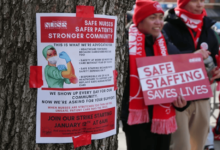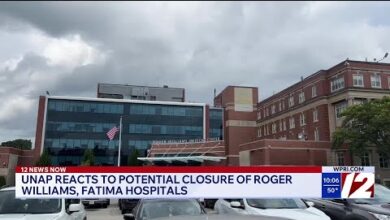Former RCN chair loses employment tribunal

The former chair of the Royal College of Nursing (RCN), Dave Dawes, has lost his employment tribunal against the college.
The ruling brings to an end a three-year battle between Mr Dawes and the RCN.
In July 2021, Mr Dawes was suspended as chair of RCN Council and was later expelled from the union following various investigations and hearings.
Mr Dawes subsequently brought a case against the RCN, arguing that he had been treated unfairly because he whistle-blew on matters related to previous RCN chief executive and general secretary Dame Donna Kinnair.
However, the tribunal determined that Mr Dawes could not be called a whistleblower because he did not meet the requirement of being a “worker” for the college.
Mr Dawes’ role as council chair was a fiduciary one: he was not employed by the college, there was no contract either written or implied and he was not paid.
Even if he were a worker, the tribunal determined, Mr Dawes’ actions would not count as whistleblowing.
The saga began in June 2021 when Dame Donna was suspended from her duties pending an investigation into allegations about her conduct which was to be led by Bruce Carr KC.
Later that month, Dame Donna and the RCN agreed a deal for her to quit, which involved a payout and an agreement that the ordeal would be kept secret from the public and wider RCN membership.
Members of RCN Council, including Mr Dawes, voted to approve this deal.
Mr Carr’s investigation was then extended to be a “wider organisational review”, becoming what is now known as the Carr report, which was released in October 2022 and revealed serious concerns about the culture of the RCN.
Following Dame Donna’s departure, a question-and-answer (Q&A) session was held for RCN staff on 7 July by Pat Cullen, who became acting chief executive and general secretary, and Mr Dawes.
The tribunal report said the meeting “did not go well”. Following the Q&A, the RCN received a lot of complaints about Mr Dawes’ responses and behaviour in the session, including claims of “sexist and racist behaviour”.
It was agreed that Mr Dawes would step aside as chair of council for an investigation to take place into these complaints, but he would remain as an RCN council member for the North West.
However, Mr Dawes took issue with the way that the RCN communicated this news to members, as he felt the college had made it out like he had permanently stepped down, rather than temporarily stepped aside.
He made a complaint to the RCN that the communication was “false and damaging”.
Meanwhile, on 13 July, further complaints about Mr Dawes were received by the RCN, this time relating to posts he had made on social media in 2011 and 2015.
These posts made reference to “non-consensual sexual encounters with women, jokes about underage sex and using alcohol to influence consent for sex”, the tribunal heard.
More on the Dave Dawes case
On 14 July, Mr Dawes was suspended and was informed that an independent investigation would be held into the complaints received about his behaviour among other matters.
By August, Mr Dawes claimed he was becoming concerned that a “cover up” was ensuing over the Carr review and its connection to Dame Donna.
He made disclosures to the press – as well as to the Information Commissioner’s Office and the Trade Union Certification Officer – raising concerns about the way his own case had been handled but also outlining information about Dame Donna’s settlement and the investigation into her conduct.
Stories began to appear in the press such as one in the Daily Mail titled “Royal College of Nursing secretly paid former boss a £135,000 payoff after she was investigated over her links to Prince Charles’ donor George Farha”.
The RCN subsequently launched a second investigation into Mr Dawes in relation to “breaches of duty and confidence” for leaking information to journalists and breaking Dame Donna’s confidentiality agreement.
The investigations into Mr Dawes commissioned by the RCN found that he was guilty of gross misconduct, leading to his being expelled from RCN membership.
Mr Dawes had argued at the employment tribunal that he was subjected to detriment by the RCN because of his whistleblowing and that he also suffered “unjustifiable discipline”.
However, the judge has now concluded that none of his disclosures would have amounted to qualifying whistleblowing disclosures because “it was not reasonable in all the circumstances for him to make those disclosures”.
The judge rejected Mr Dawes’ claim that he thought there was going to be a cover up, noting that he did not raise this with Mr Carr, Ms Cullen or the RCN’s legal team, or attempt to use the college’s internal whistleblowing procedures.
It was instead determined that the press disclosures were made as an “act of retaliation because he had been suspended and believed he had been unfairly treated”.
However, it was noted that the allegations that Mr Dawes made to the press were either true, or he reasonably believed them to be true, and that he did not make the disclosures for personal gain.
Reflecting on the result, Mr Dawes said: “It is a disappointing verdict but whistleblowers rarely win in court against very expensive legal teams.”
He said his tribunal had “exposed” the real story behind the Carr review and he maintained that a “cover up” had taken place.
The RCN declined to comment on the result of the tribunal.







